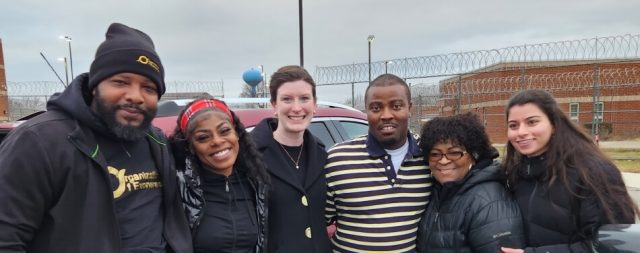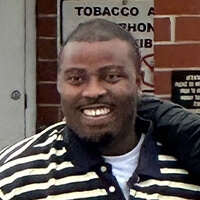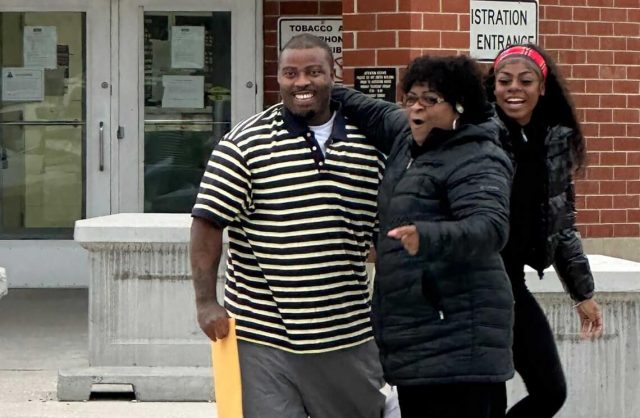
Michigan Innocence Clinic client Kelvin Nolen (third from right) celebrates his exoneration on December 19 with, from left, Marvin Cotton Jr. (Organization of Exonerees); his sister, Mercedes Sails; Michigan Innocence Clinic Fellow Elizabeth Cole; his mother, Kathy Sails; and student-attorney Reem Aburukba.
By Amy Spooner
The Michigan Innocence Clinic
December 19, 2022
 VOD Editor: The Michigan Innocence Clinic (MIC) has played a major role in most exonerations announced by Wayne County Prosecutor Kym Worthy’s Conviction Integrity Unit (CIU). The exoneration of Kelvin Nolen was announced only by the MIC to date.
VOD Editor: The Michigan Innocence Clinic (MIC) has played a major role in most exonerations announced by Wayne County Prosecutor Kym Worthy’s Conviction Integrity Unit (CIU). The exoneration of Kelvin Nolen was announced only by the MIC to date.

David Nolen
Michigan Innocence Clinic client Kelvin Nolen was exonerated and released on December 19 after serving eight years for a murder he did not commit.
Nolen was convicted for the 2014 murder and robbery of a gas station clerk in Detroit. The crime was captured on store video, but the perpetrator’s face was obscured by his hoodie. The entire case against Nolen at trial came from his estranged sister’s testimony, who said that the man in the video could be Nolen, though she couldn’t be sure.
“There was literally no other evidence against him, but that statement was enough to send Mr. Nolen away for life without parole,” said David Moran, ’91, clinical professor of law and co-founder of the Michigan Innocence Clinic.

Atty. David Moran (center with exoneree Richard Phillips) and Atty. Imran Sayed.
Nolen became the Michigan Innocence Clinic’s client in 2018, and some 13 student-attorneys worked to build Nolen’s case alongside Moran; the clinic’s co-director, Imran Syed, ‘11, a clinical assistant professor of law; and former forensic science attorney Mary Soo Anderson, ’15, who co-supervised the case with Moran.
The team presented three new pieces of evidence:
- Photogrammetric analysis from two professors of engineering who independently agreed that the perpetrator was three to four inches taller than Nolen, based on measurements of multiple landmarks in the store and the video of the perpetrator.
- An affidavit from a woman whom Nolen recognized in the store surveillance video. The woman had been in the store at the same time as the perpetrator, who committed the crime shortly after the woman left. The Michigan Innocence Clinic found the woman, who stated that she got a good look at the perpetrator. In fact, she tried to make eye contact with the clerk to warn him that the man in the hoodie was behaving suspiciously. Crucially, the woman confirmed that she knows Nolen and that he was not the man in the hoodie.
- An affidavit from Nolen’s sister in which she said the authorities had misrepresented what she said about whether her brother was the man in the video.

Michigan Innocence Clinic client Kelvin Nolen, pictured here with his mother, Kathy Sails, and his sister, Mercedes Sails, after his exoneration, spent eight years in prison for a murder and robbery that he didn’t commit. His is the clinic’s 36th exoneration since its founding in 2009.
In February 2021, the Michigan Innocence Clinic filed a motion for relief from judgment in the trial court but agreed to put that motion on hold while presenting this new evidence to the Wayne County Prosecutor’s Office Conviction Integrity Unit (CIU). After review, the CIU agreed to join the motion based on the first two pieces of new evidence listed above and to stipulate that Nolen’s convictions and sentences be vacated, that the charges be dismissed, and that he be released from custody immediately.
“I am thrilled that Kelvin Nolen’s conviction has been overturned and that he is with his family again,” Moran said. “Mr. Nolen owes his freedom to the hard work and dedication of our students, who took measurements at the store, tracked down the woman in the video, and met with Mr. Nolen’s estranged sister. I hope that the police and prosecution will reopen the case to see if they can determine who actually committed this terrible crime.”
Established in 2009, the Michigan Innocence Clinic is the first exclusively non-DNA innocence clinic in the country. Since its inception, the Michigan Innocence Clinic has successfully won the release of 36 men and women who had been wrongfully convicted of crimes and served anywhere from a few months to 46 years in prison.
The student-attorneys who worked on the case include alumni Caroline Howe, ’19, Amanda Kenner, ’19, Mary Novakovic, ’21, Taylour Boboltz, ’21, Philip Cho, ’21, Juan Mora, ’21, Ziv Ben-Shahar, ’22, and Allison Epshteyn, ’22, as well as current third-year students Riyah Basha and Saba Khan and current second-year students Reem Aburukba, Martin Greene, and Luis Ramos.
“They did terrific work, and they should be proud of the role they played in securing justice for Mr. Nolen,” Moran said, noting that he had exchanged celebratory emails with many alumni who had worked on the case, including the former student-attorneys who took the measurements in the store that facilitated the exculpatory photogrammetry analyses.
“Amanda [Kenner] and I started working on Mr. Nolen’s case in our last semester of law school, and while we were hopeful, we knew it would be an uphill battle to overturn his conviction,” said Howe, recalling the pair’s travel to the crime scene to take the critical measurements for the experts’ review. “This is truly the best news. ”
Said Moran, “These cases stick with our students after they graduate, so it’s an exciting moment for everyone to reach this kind of closure.”




